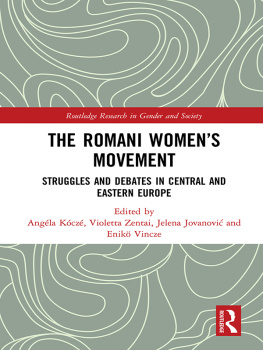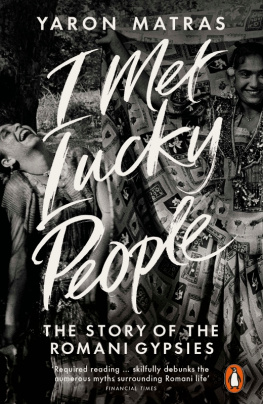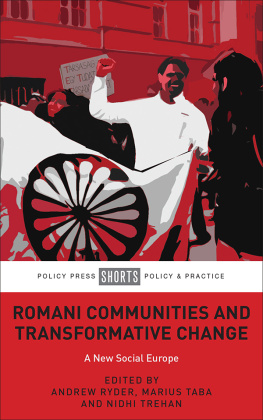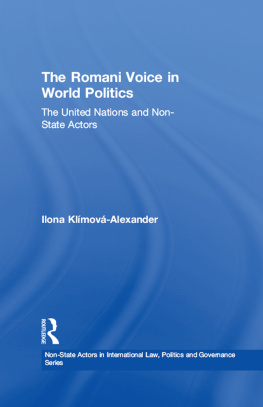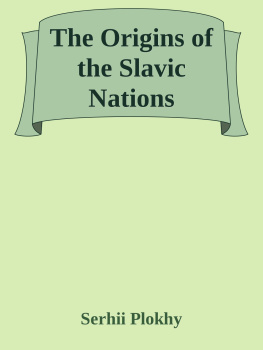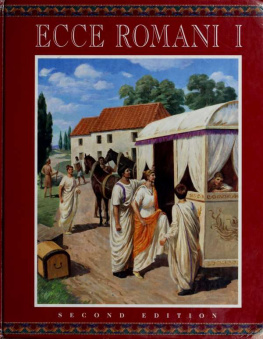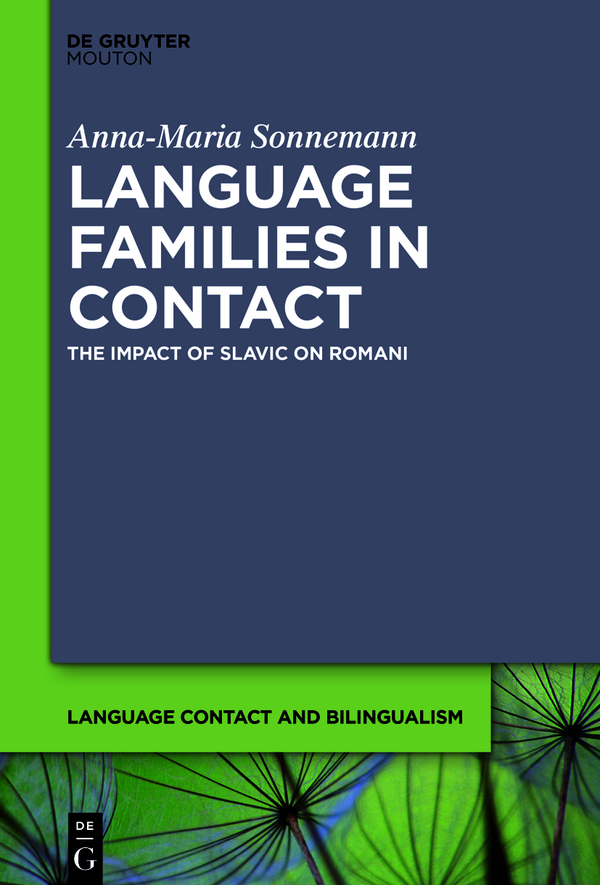Language Contact and Bilingualism
Edited by
Yaron Matras
Volume
ISBN 9783110756043
e-ISBN (PDF) 9783110756173
e-ISBN (EPUB) 9783110756241
Bibliographic information published by the Deutsche Nationalbibliothek
The Deutsche Nationalbibliothek lists this publication in the Deutsche Nationalbibliografie; detailed bibliographic data are available on the Internet at http://dnb.dnb.de.
2022 Walter de Gruyter GmbH, Berlin/Boston
This book is dedicated to my parents.
Acknowledgements
Writing this book which is based on my Habilitation thesis accepted by the Faculty of Arts and Humanities of the University of Cologne in October 2021 would not have been possible without the professional and emotional support of many people.
First and foremost, I am enormously grateful to Yaron Matras for his invitation to publish the manuscript in the Language Contact and Bilingualism series at De Gruyter Mouton, for having been a great advisor over several years and for his appreciation of my work.
Very warm thanks go to my teachers of Romani Martin Glis and Iveta Kokyov and my long-standing mentors, supervisors and friends Sebastian Kempgen and Daniel Buni.
I want to thank Kirstin Brgen and Birgit Sievert for the very professional and kind cooperation during the process of preparing the manuscript for print, as well as the two anonymous reviewers for their incredibly thorough revision of the manuscript and countless valuable hints which definitely helped to improve the quality of the book.
The questions and comments of Viktor Elk, Mirjana Miri, Nikola Rai and all the participants of the International Conference of Romani Linguistics 2020 and 2021 have been very helpful, just like the discussions with and hints by Norbert Boretzky, Christian Sappok, Manfred Krug, Achim Rabus, Nicolas Jansens, Birgit Hellwig and Eugen Hill.
Finally, but very importantly, I want to thank my parents Gudrun () and Herbert Meyer, my husband Till Sonnemann and his parents Gyburg and Jrgen, my life-coaches Luka Kadovi and Andrew Woods with Olina as well as my wonderful (former) colleagues in Bamberg and Cologne for always believing in me.
Bamberg, July 2022
Abbreviations
ABL
ablative
ACC
accusative
ADJ
adjective
ADV
adverb
ART
article
CAUS
causative
COMP
complementizer
COND
conditional
DAT
dative
DIM
diminutive
F
feminine
FUT
future
GEN
genitive
IMP
imperative
INF
infinitive
INS
instrumental
IPF
imperfect
IPFV
imperfective
LOC
locative
M
masculine
N
neuter
NEG
negation
OBJ
object
OBL
oblique
PASS
passive
PFV
perfective
PL
plural
PREF
prefix
PRF
perfect
PRS
present
PST
past
PTCP
participle
REFL
reflexive
SBJ
subject
SG
singular
V
verb
Introduction
Romani, the language of the Roma, Sinti, Kal, Manua and other European people groups should be of relevance for Slavicists as well as the Slavic languages for Romologists, because the contact occurring between their respective languages is, so to speak, the case of language contact par excellence in Eastern Europe. Native speakers of Slavic languages and native speakers of Romani live in close proximity in Eastern, South-Eastern and Central Eastern Europe.
According to censuses and estimates, the Slavic-speaking countries with the largest number of Roma currently living there are Bulgaria, Slovakia and Serbia (cf. ); the actual numbers are, again, probably much higher. It is important to note, though, that the number of Roma does not equal the number of Romani speakers. In Romania for instance, but also in Hungary and elsewhere, many Roma speak Romanian, and there are more Roma than Romani speakers in other countries as well. Outside Europe, there are large Roma communities in the USA, Canada, Brazil, Argentina and Australia, among others. Correspondingly, Romani thus represents one of the largest minority languages both within Europe and worldwide.
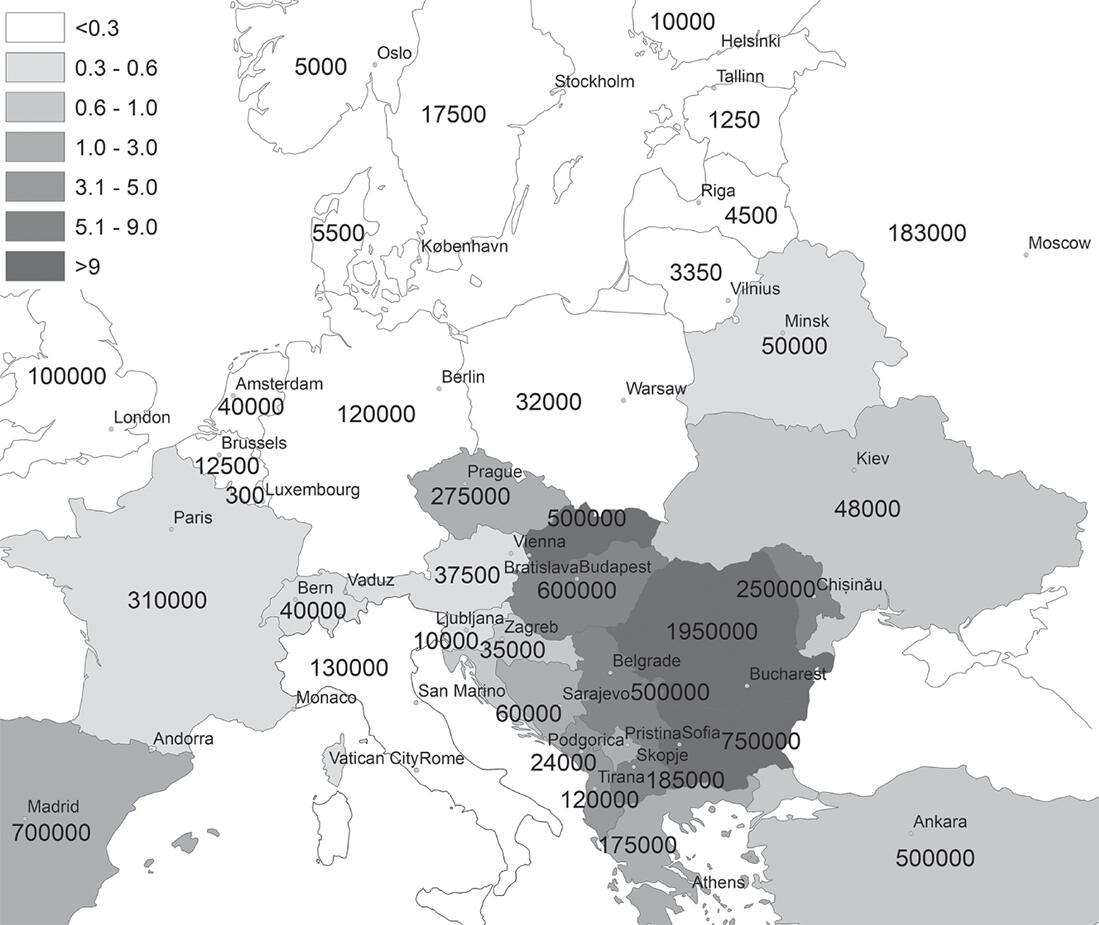
Fig. 1: Estimated percentage share of Roma in total population by country and Roma population in absolute numbers (status: 2010).
The language is one of the most important factors in the construction of Roma identity; they themselves refer to it as romanes (in different variants), literally in the manner of the Roma, or romani hib Roma language, from which the term Romani, commonly used in linguistics, is derived (which is the default mode of communication among Roma. In this case, the speaker switches freely between Romani, Russian and Ukrainian (the latter two are marked in italics).
(1)
Znait, dro ve keras bjau. Terno, terni. Kolys, tak. (Gimpeny)
Bjau baro. Nu kak, vs, aj si do foro
hto zavedujuyj tam xata [g]de samolty,
nasaro aj baro manu, lestero njina nej, jov barvalo.
I esli tahda... a?
[Interviewer:] Terno manu?
No dro bera, let tridcat pjat, let tridcat pjat emu tam, nu do soroka, tak vot,
a je ternji, dal pala romeste pal e haveste, pal o rom,
phenel ax intjerjesno varkjedy, esli koneste motocyklos kaj est kasa,
oo kada baro manu barvalo, a leste matocyklo kaj est kasa,
ja poedu posmotrju cyganskuju svadbu, intjeresno, poedu,
huuj jov tradel motocyklosa.
Oj! Je bravinta adoj, vs, pjaki, tradel ko Roma dro ve, te dikhel.
Pritradel, oooj romale! Romale! Raj baro tradel,
hej, manu baro, foroste, len ... len huven pal o skamind, len, dikhen,
vstreajtes, huven les pal o skamind.
Davaj huljaj, pij, huljaj.
A i terni lel rjumki tak dve, pro ero huvel,
ternji, ukar, bravinta si, krasavica,
i pola v pljas, pljasatj, rjumki duj bravintasa,
huvel pro ero i pola v pljas. [...]
So, we have a wedding in a forest. Groom, bride. Some time ago, yes.
A big wedding. What of it, thats all, and in the town there is
it is the director of the house where there are planes,
some kind of important man, he has nobody, he is rich.
And if so... what?
[Interviewer:] A young man?
Well, in years, thirty-five, thirty-five years old, well, not more than forty, there you go,
and there is the bride, she is getting married to a boy, to a man,
she says oh, thats interesting sometimes, if someone has a motorbike and there is a luggage box,
ooh this important man is rich, and he has a motorbike and there is a luggage box,
Ill go and see a Gypsy wedding, interesting, I will go,
hoo, he rides a motorbike.
Oh! There is vodka there, everything, drinks, he goes to the Roma into the forest, to have a look.
He arrives, heeey Roma! Roma! A gentleman is coming,


